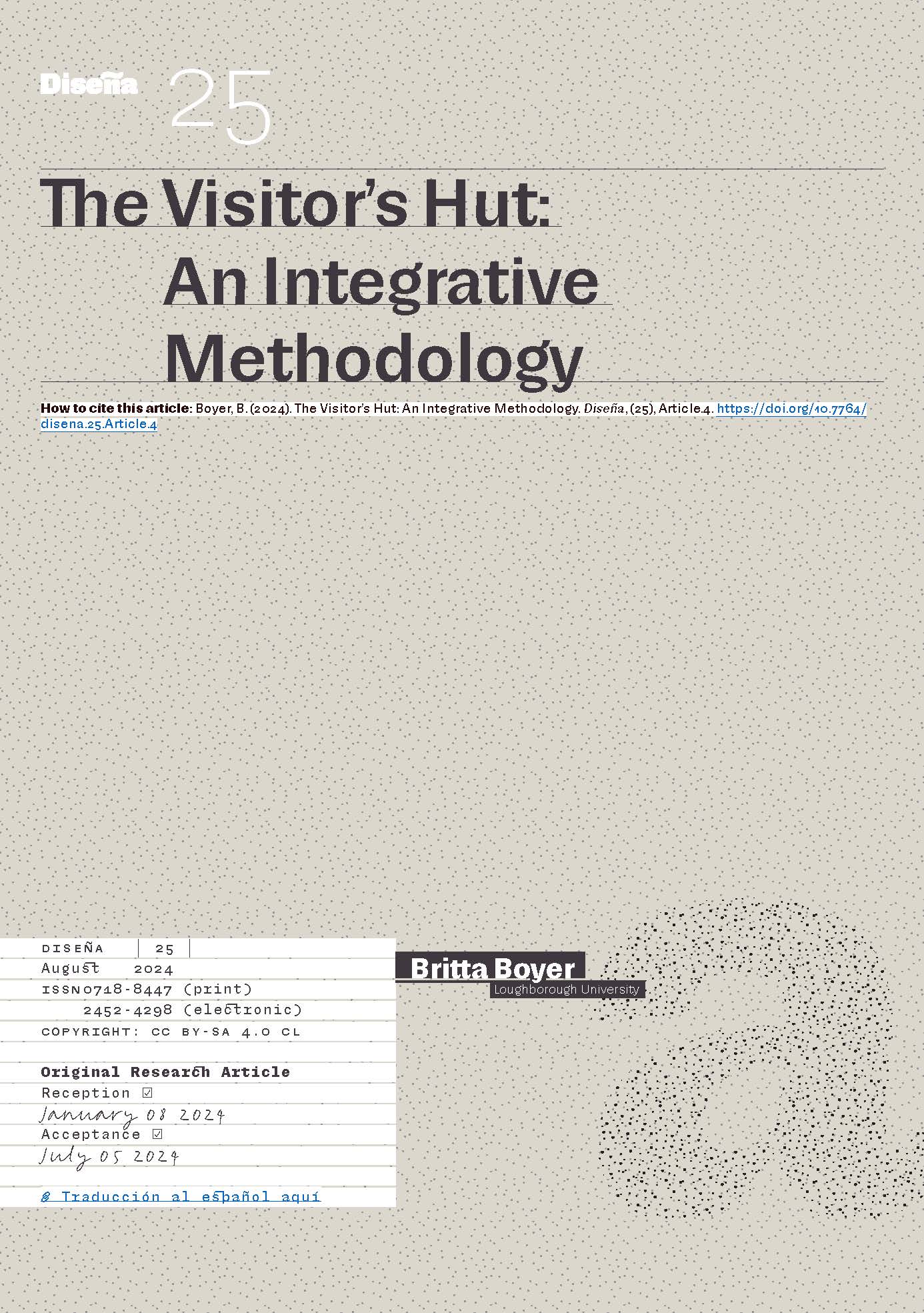The The Visitor’s Hut: An Integrative Methodology
Main Article Content
Abstract
International collaborative projects can export inequalities and power dynamics across borders. The Visitor’s Hut offers transformative possibilities in knowledge recovery that advance other ways of knowing through its active, other-seeking dialogic approach. Visiting prioritizes more equitable and community-grounded ways to mitigate power imbalances in international design research, where the methodology can become the site for repair by negotiating and translating, through design. In this paper, I showcase the methodology, first theorized in my PhD thesis and further put into practice through research on weaving ecologies in Myanmar, illustrating how knowledge is dynamic, created alongside others in a shared third space between cultures, languages, and people. This ongoing decolonization discussion invites us, as academic researchers, scholars, and practitioners, to actively reflect upon ‘me’, ‘us’, and ‘them’ within different temporal dimensions, remote relations, and the increasing use of technology.
Downloads
Article Details

This work is licensed under a Creative Commons Attribution-ShareAlike 4.0 International License.

This work is licensed under a Creative Commons Attribution-ShareAlike 4.0 International license.
COPYRIGHT NOTICE
All contents of this electronic edition are distributed under the Creative Commons license of "Attribution-ShareAlike 4.0 Internacional" (CC-BY-SA). Any total or partial reproduction of the material must mention its origin.
The rights of the published images belong to their authors, who grant to Diseña the license for its use. The management of the permits and the authorization of the publication of the images (or of any material) that contains copyright and its consequent rights of reproduction in this publication is the sole responsibility of the authors of the articles.
References
Akomolafe, B. (2024, May 16). On Doors and cracks. https://www.bayoakomolafe.net/post/on-doors-and-cracks
Bhabha, H. K. (2004). The Location of Culture (2nd ed.). Routledge. https://doi.org/10.4324/9780203820551
Botero, P. (2019). Sentipensar. In A. Kothari, A. Salleh, A. Escobar, F. Demaria, & A. Acosta (Eds.), Pluriverse: A Post-Development Dictionary (pp. 302–305). Tulika.
Boyer, B. (2022). Many Worlds Meeting. Unsettling Design Practice at the Intersection of Mobility and Possibility [Doctoral Dissertation, Loughborough University]. https://doi.org/10.26174/thesis.lboro.21089275.v1
Boyer, B. (2024a, June 17). Overview of Visual Archive for Myanmar Weaving Ecologies [Figure]. Loughborough University. https://doi.org/10.17028/rd.lboro.26042149.v1
Boyer, B. (2024b, June 17). Photovoice by Ma Su Su [Figure]. Loughborough University. https://doi.org/10.17028/rd.lboro.26039989.v1
Boyer, B. (2024c, June 17). Photovoice Visual Instructions [Figure]. Loughborough University. https://doi.org/10.17028/rd.lboro.26039986.v1
Boyer, B. (2024d, June 26). Bruna’s Template for Reciprocity with Myanmar Photovoice Participants [Figure]. Loughborough University. https://doi.org/10.17028/rd.lboro.26068465.v1
Boyer, B. (2024e, June 26). Plants from Ma Su Su’s Garden [Figure]. Loughborough University. https://doi.org/10.17028/rd.lboro.26068417.v1
Braidotti, R. (1994). Nomadic Subjects: Embodiment and Sexual Difference in Contemporary Feminist Theory. Cambridge University Press.
Braidotti, R. (2014). Writing as a Nomadic Subject. Comparative Critical Studies, 11(2–3), 163–184. https://doi.org/10.3366/ccs.2014.0122
Business & Human Rights Centre. (2023, August 16). Falling Out of Fashion: Garment Worker Abuse Under Military Rule in Myanmar. Business & Human Rights Resource Centre. https://www.business-humanrights.org/en/from-us/briefings/falling-out-of-fashion-garment-worker-abuse-under-military-rule-in-myanmar/
Conversation: Etymology of Conversation. (n.d.). In Etymonline. https://www.etymonline.com/word/conversation
Dewey, J. (1997). Experience and Education. Simon & Schuster.
Escobar, A. (2016). Thinking-feeling with the Earth: Territorial Struggles and the Ontological Dimension of the Epistemologies of the South. AIBR. Revista de Antropología Iberoamericana, 11(1), 11–32. https://doi.org/10.11156/aibr.110102e
Fals Borda, O. (1984). Resistencia en el San Jorge. Carlos Valencia.
Fals Borda, O. (1999). Kinsey Dialogue Series #1: The Origins and Challenges of Participatory Action Research. Participatory Research & Practice, 10, 1–38.
Hirmer, M. (2023). Editorial: Introducing a New, Radically Inclusive, Decolonial Knowledge Landscape. Decolonial Subversions, Special Issue Vernacular Cultures of South Asia 2023-2024, 1–12.
Ingold, T. (2005). Epilogue: Towards a Politics of Dwelling. Conservation and Society, 3(2), 501–508.
Ingold, T. (2011). Being Alive: Essays on Movement, Knowledge and Description. Routledge.
Madison, G. (2006). Existential Migration. Conceptualising Out of the Experiential Depths of Choosing to Leave “Home.” Existential Analysis, 17(2), 238–260.
Moustakas, C. E. (1990). Heuristic Research: Design, Methodology, and Applications (p. 130). Sage.
Suzina, A. C. (2023, April 14). The Midas Touch. Medium. https://medium.com/@suzinaana/the-midas-touch-ed2806d17ddc
Tuck, E., Stepetin, H., Beaulne-Stuebing, R., & Billows, J. (2023). Visiting as an Indigenous Feminist Practice. Gender and Education, 35(2), 144–155. https://doi.org/10.1080/09540253.2022.2078796
Tuck, E., & Yang, K. W. (2014). R-Words: Refusing Research. In D. Paris & M. T. Winn (Eds.), Humanizing Research: Decolonizing Qualitative Inquiry with Youth and Communities (pp. 223–247). SAGE Publications, Inc. https://doi.org/10.4135/9781544329611
Viaene, L., Laranjeiro, C., & Miye, T. (2023). The Walls Spoke When No One Else Would: Autoethnographic Notes on Sexual-power Gatekeeping within Avant-garde Academia. In E. Pritchard & D. Edwards (Eds.), Sexual Misconduct in Academia: Informing an Ethics of Care in the University (pp. 208–225). Routledge. https://doi.org/10.4324/9781003289944-17
Weber, A. (2019). Enlivenment: Toward a Poetics for the Anthropocene. MIT Press. https://doi.org/10.7551/mitpress/11563.001.0001
Williams, D. (2018). Fashion Design as a Means to Recognize and Build Communities-in-Place. She Ji: The Journal of Design, Economics, and Innovation, 4(1), 75–90. https://doi.org/10.1016/j.sheji.2018.02.009
Willis, A.-M. (2022). Unsettlement. Urmadica, 2, 9–14.

